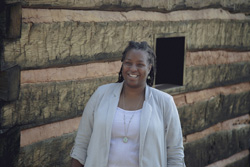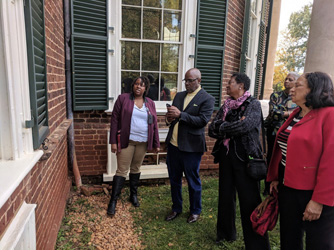Niya Bates, Director of African American History and Getting Word Oral History Project at Monticello, Charlottesville, Virginia

Niya Bates is Director of African American History and Getting Word Oral History Project in the International Center for Jefferson Studies at Monticello. She has been with Monticello since 2016. Started in 1993, Getting Word is a growing archive of more than 200 oral histories of people descended from slaves at Monticello. Ms. Bates works to engage local and national audiences in dialogue about Monticello, slavery and its enduring legacies, and race. She earned a B.A. in African and African American Studies and an M.A. in Architectural History and Historic Preservation–both from the University of Virginia. Her research focuses on enslaved families at Monticello, African American life in the Reconstruction Era in Virginia, and rural cultural preservation. She has published articles in Arris: Journal of the Southeast Chapter of the Society of Architectural Historians and Thomas Jefferson’s Monticello.
What led you to your field?
I did not grow up knowing that I wanted to work in historic preservation, and I suspect most people do not. I was first exposed to the field as an undergraduate student in 2011 on a class field trip to a plantation outside of Charlottesville, VA. After that trip, I became interested in how Black history and the lives of enslaved people are often excluded from how the public engages with history at plantations.
In 2014, I interned at Thomas Jefferson’s Monticello in the Restoration Department doing research on extant slave quarters in Virginia that would inform reconstructions along Mulberry Row. After that, I worked at James Madison’s Montpelier as a founding member of their Historic Preservation Department before returning to Monticello as a public historian and director of the Getting Word African American Oral History Project.
How does what you do relate to historic preservation?
My historic preservation background and training informs the way I approach engaging descendants of the enslaved community at Monticello. I came into this position primed to understand the relationships between places, landscapes, and family history. It shapes the research questions that I ask about the enslaved community: their occupations, their living arrangements, their mobility and access, how they may have experienced the landscape at Monticello, forces that influenced their lives, what their descendants may have learned, and where their descendants ended up.

Every day, I work with a team at Monticello to share those stories with our visitors and to preserve family histories for the next generation of descendants. That work often involves archival and genealogical research, but increasingly we also find ourselves researching other sites and properties not connected to Monticello as a result of oral histories collected from descendants of the enslaved community at Monticello. For me, it has resulted in two National Register nominations for Rosenwald schools associated with the descendant community.
Why do you think historic preservation matters?
In Charlottesville and Albemarle, white supremacist violence throughout the summer of 2017 sparked renewed interest in historic preservation. The entire country watched as we began to respond to racism and white supremacy by reinterpreting our public landmarks and historic sites with more inclusive, more historically accurate narratives. My work here has shown me just how immensely important it is to get our history right.
The myth-making of the early 20th century has been allowed to dominate our public memory. We can correct that through more diverse and inclusive historic preservation practices and education. Our field depends on making this shift, especially when not doing so results in violence against entire groups of people: Black Americans, Latinx Americans, women, LGBTQ+ community, marginalized religious groups, immigrants, etc.
What courses do you recommend for students interested in this field?
Course offerings will differ depending on the program, but I highly recommend taking courses in anthropology, sociology, African American studies, Latinx studies, women and gender studies, media studies, and community history. Take the classes that get you off campus and into the community. Doing this will improve the way you engage historic preservation and push your work to be more focused on cultural history and people instead of architectural integrity and material culture alone.
Do you have a favorite preservation project? What about it made it special?
In my spare time, I write National Register nominations for Black historic sites. I have nominated three Rosenwald Schools, and I am currently working on a historic Black church and its cemetery. The most exciting and rewarding part of my work is reconnecting families with each other and restoring connections with important places in their families’ histories. Meeting people in the community and hearing them talk about why a place matters to them and is worth preserving is also tremendously special to me. I take pride in getting someone to move from “I didn’t think anyone would care” to “we are saving this place/story for our children and grandchildren.”
How do you think the national historic preservation programs help your community?
The national preservation programs provide a starting point and framework for preserving local history through formal preservation processes. They help people and communities to think about how to more holistically engage the history around them in their neighborhoods, classrooms, monuments, and other public spaces.
Do you have advice for novice preservationists?
Don’t be afraid to take on new projects and enter new spaces. Preservation is best learned through practice. It is a field that relies on working cooperatively with other people, researching across disciplines, and engaging with those who might not share your background. Get comfortable with having uncomfortable conversations about history, politics, race, and class.
Read more Q&A stories about the Preservationists in Your Neighborhood!